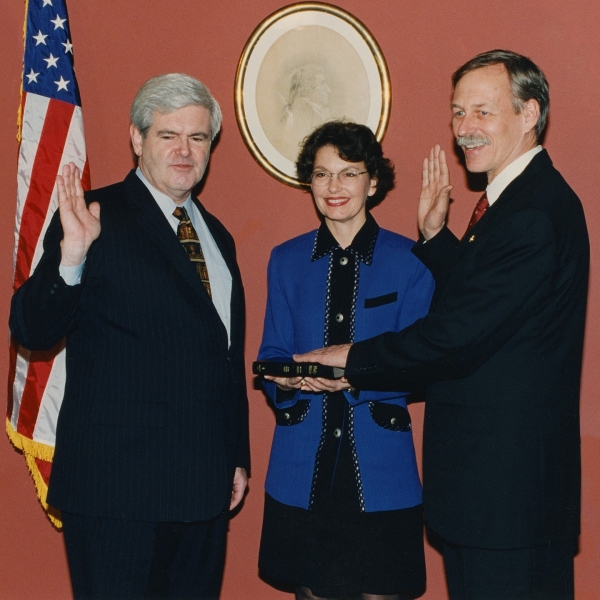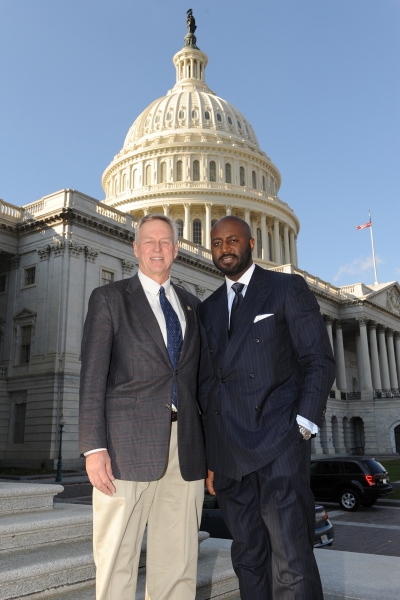When he entered politics, Vic Snyder’s background as a physician with a law degree did not fit the traditional mold. Remarking on his varied professional and educational background and interests, Snyder has jokingly called himself “a job hopper.”1 However, it is clear that, prior to seeking public office, Snyder consistently aligned his interests with service to others.
ENTERING
Public Office
Snyder was first elected in 1990 to the Arkansas General Assembly as a state senator—representing portions of Pulaski County—until being elected to the U.S. House of Representatives in 1996. From the start, he was a free-thinker who did not fit Arkansas political convention. Over the course of his six years in the state Senate, Snyder became known for “his support of conservation issues, his efforts to overturn anti-gay laws in Arkansas, and his challenge to the power of the Arkansas Highway Commission.”2
STANDING OUT AMONG
The Politicians
However, Snyder stood out among the state’s fellow Democratic elected officials by taking more progressive positions than many of his moderate to conservative co-partisans in Arkansas. His voting behavior was described as being “close to the center of House Democrats, but his [is] the most liberal in the Arkansas delegation and occasional maverick. He voted for needle exchanges and against the partial-birth abortion ban. In 2004, he opposed a state constitutional amendment to ban same-sex marriage.”3 Perhaps the two most controversial votes of Snyder’s Congressional career were his opposition to the authorization of military force in Iraq in 2003 and support of the Affordable Care Act in 2010. However, Snyder also took more moderate positions on balancing the federal budget, trade, and veterans’ issues. In the U.S. House, Snyder’s committee assignments included Veterans Affairs, Armed Services, and chairman of the Armed Services Subcommittee for Oversight and Investigations.
While serving in Congress, Snyder refused to fundraise in off-years. This freed him of some of the strain plaguing House members, who often feel they must constantly prepare for the next election cycle. Snyder admitted this made it challenging to recoup the funds to campaign, but he believed it was healthier for democracy, the governmental system, and the individual member of Congress to focus on the role he was elected to do instead of fundraising. His reputation for integrity and thoughtfulness crossed the ideological divide. In 2004, the conservative statewide newspaper, the Democrat-Gazette, endorsed Snyder’s re-election bid over a Republican challenger, explaining, “While we may abhor some of his political stances, there is no doubting the sincerity with which he takes them. Or his patriotism…We’re endorsing an honorable opponent today, not his politics.”
STEPPING DOWN FROM
U.S. Congress
In 2010, Snyder, a reform-minded individual and father of four, announced he would not seek an eighth term in the U.S. House. In his announcement, he stated, “2010 will be a robust election year during which great forces collide to set the direction for our country for another two years […] I have concluded that these election-year forces are no match for the persuasive and powerful attraction of our three one-year old boys under the leadership of their three-year old brother, and I have decided not to run for re-election.”4 When asked about his keys to political success, Snyder said elements included seeking to learn from people you disagree with and learning enough about an issue so as to be able to explain your vote to people back home.
For More Information:
- Victor F. Snyder interview by Scott Lunsford, August 23, 2012, Arkansas Memories Project, The David and Barbara Pryor Center for Arkansas Oral and Visual History, Fayetteville, AR.
- Steven Teske, “Victor F. Snyder (1947–),” Encyclopedia of Arkansas, Central Arkansas Library System, August 21, 2015.
- Michael Barone and Richard E. Cohen, The Almanac of American Politics (Washington, D.C.: National Journal Group, 2007).
- Janie Lorber, “Another House Democrat Bows Out,” The New York Times, January 15, 2010.
Barone, Michael, and Richard E. Cohen. The Almanac of American Politics. Washington, D.C.: National Journal Group, 2007.
Lorber, Janie. “Another House Democrat Bows Out.” The New York Times. January 15, 2010. https://thecaucus.blogs.nytimes.com/2010/01/15/another-house-democrat-announces-retirement/.
Teske, Steven. “Victor F. Snyder (1947–).” Encyclopedia of Arkansas. Central Arkansas Library System. August 21, 2015. https://encyclopediaofarkansas.net/entries/victor-f-snyder-4655/.
Victor F. Snyder interview by Scott Lunsford. August 23, 2012. Arkansas Memories Project. The David and Barbara Pryor Center for Arkansas Oral and Visual History, Fayetteville, AR.
About the Author:
John C. Davis is an associate professor of political science at the University of Arkansas at Monticello. His research interests include political parties, voting, Southern politics, and Arkansas politics. A native Arkansan, John lives in Monticello with his wife, Ember, and two children, John Lee, and Grace Anne.










